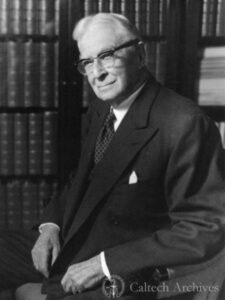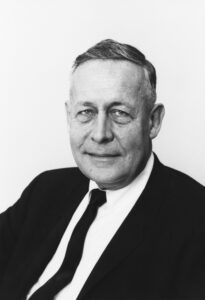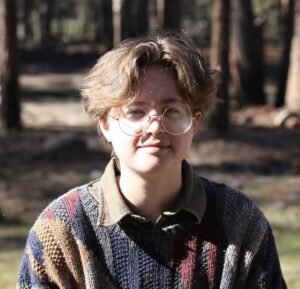By Shannon White
This month marks the seventy-fifth anniversary of the term “Cold War” being used to describe the relationship between the United States and the Soviet Union. On April 16, 1947, Bernard Baruch gave a speech in the South Carolina House of Representatives, telling his audience, “Let us not be deceived—we are today in the midst of a cold war.”
Baruch, a financier and presidential advisor during the Wilson, Roosevelt, and Truman administrations, was privy to the international tensions surrounding nuclear arms as a representative to the United Nations (UN) Atomic Energy Commission.

The UC Berkeley Oral History Center (OHC) has several interviews related to Bernard Baruch and the Cold War, including oral histories from Philip Read Bradley Jr., a mining engineer and family friend of Baruch; Charles Easton Rothwell, a State Department employee who contributed to the founding of the UN; and Roger Randall Dougan Revelle, a scientist and the former director of the Scripps Institute of Oceanography. Rothwell and Revelle in particular are concerned with discussing the Cold War in general, including issues related to international relations and atomic energy regulation and testing.
In his interview Philip Read Bradley Jr.: A Mining Engineer in Alaska, Canada, the Western United States, Latin American, and Southeast Asia, Bradley says of Baruch’s character:
Afterwards I saw a good deal of Baruch, and came to enjoy him, and admire him very, very much. I was talking to him one day, and he said: “Back in my time, when things were good, I could look at the economy and make a prediction that I regarded as reliable, about what would happen next, or in a few years, and I could act on that. And that made me a good deal of money.” He said, “It makes a little difference who’s in the White House.” And I said, ‘What do you think of Truman?’ And he said, ‘He’s a nincompoop.” He says, “We’ve got a nincompoop in the White House now.” But anyhow, Baruch had lots of rules; my dad used to quote them. One of the rules was, “No use doing business unless it’s good business.”

In the first of his four interviews (Roger Randall Dougan Revelle: Oceanography, Population Resources and the World, Volume 1: Preparation for a Scientific Career), Revelle discusses the early nuclear arms race, including fears about the control of nuclear weapons. Bernard Baruch himself was instrumental in the creation of the Baruch Plan, a proposal by the US government for decommissioning nuclear weapons and internationalizing and regulating atomic energy. Revelle mentions the Baruch Plan, and the related Acheson-Lilienthal Report on international control of nuclear weaponry, in his discussion of early nuclear testing at Bikini Atoll:
“The Russians didn’t have any atomic bombs at that time, and there were some people out at Bikini, Admiral Solberg was one, who suggested that— [brief discussion about a whale visible off the coast] —that we should tell the Russians that we would use our atomic weapons against them if they developed them. That we ought to decide right now to abolish the things on both sides. There was one famous Baruch plan, Bernard Baruch and [David E. ] Lilienthal, I guess, who was by that time the chairman of the Atomic Energy Commission, which had tried to reach an agreement with the Russians about atomic weapons, to not develop them, not have them. But this never got anywhere.”
When asked about the UN Atomic Energy Commission, of which Baruch was a part, Charles Rothwell said in his oral history Charles Easton Rothwell: From Mines to Minds, “I was aware of some of the problems. And I got to know Bernie Baruch, because I had to staff his operations too.”
Rothwell describes Baruch as dedicated to his work, claiming that, “He was very serious about wanting controls placed on the development of the capacity to produce nuclear weapons, and would have preferred that it not even stretch nearly as far as it did in Europe. We’re the real culprits in the use of nuclear energy for war purposes because we did it.”
The mentions of Bernard Baruch in the Oral History Center are quite interesting to look back on as a marker of such an important period of world history. In particular, Rothwell’s and Revelle’s interviews discuss not just Baruch’s involvement in the quest for nuclear regulation, but the general climate of the United States and the UN in the period following World War II.

You can find the interviews mentioned here and all our oral histories from the search feature on our home page. Search by name, keyword, and several other criteria.
Shannon White is currently a third-year student at UC Berkeley studying Ancient Greek and Latin. They are an undergraduate research apprentice in the Nemea Center under Professor Kim Shelton and a member of the editing staff for the Berkeley Undergraduate Journal of Classics. Shannon works as a student editor for the Oral History Center.
Related Resources from the OHC and The Bancroft Library
The Bancroft Library contains hundreds of materials related to the Cold War, including illustrations, interviews, books, and speeches. For some items in the collection related to Bernard Baruch specifically, see:
Baruch, Bernard M., Freedom for Man: – a world safer for mankind. An address delivered … at a meeting held at the Woodrow Wilson Foundation, May 25, 1955. Bancroft Pamphlet
p E767.1.B3.
Baruch, Bernard M., The making of the reparation and economic sections of the Treaty. Bancroft (NRLF) D648 .B3
The Oral History Center also has many interviews that discuss the Cold War, including several from the Free Speech Movement Oral History Project, the Oakland Army Base Oral History Project, and the Rosie the Riveter World War II American Home Front Oral History Project. From our home page, go to “Oral Histories” > “Projects.” For a look through some of the oral histories concerning the Nixon administration, check out “The Week that Changed the World: Nixon Visits China,” by Shannon White. See also, “‘I take this obligation freely:’ Recalling UC Berkeley’s loyalty oath,” by Shannon White with research by Adam Hagen.
About the Oral History Center
The Oral History Center of The Bancroft Library has interviews on just about every topic imaginable. You can find the interviews mentioned here and all our oral histories from the search feature on our home page. Search by name, keyword, and several other criteria. We preserve voices of people from all walks of life, with varying political perspectives, national origins, and ethnic backgrounds. We are committed to open access and our oral histories and interpretive materials are available online at no cost to scholars and the public.